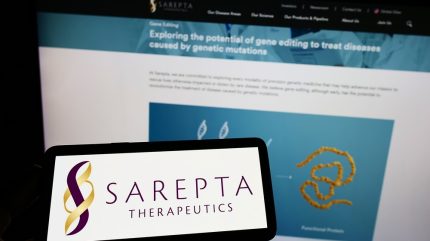

After two weeks in the regulatory wringer, Sarepta Therapeutics has been given clearance to continue shipments of its Duchenne muscular dystrophy (DMD) gene therapy Elevidys (delandistrogene moxeparvovec) into the US.
The US Food and Drug Administration (FDA) has told Sarepta it can lift the temporary shipment pause after it determined a third child’s death was unrelated to treatment with Elevidys.

Discover B2B Marketing That Performs
Combine business intelligence and editorial excellence to reach engaged professionals across 36 leading media platforms.
The company has endured a tumultuous quarter regarding the safety of Elevidys. Before this update, Sarepta had reported two patient deaths linked to the drug this year.
The most recent death was an eight-year-old boy in Brazil who died in mid-June. The FDA investigated and determined his death to be unrelated to treatment with the gene therapy after both Roche, which has rights to the drug outside the US, and Sarepta both issued a clarifying statement on 25 July that reiterated this position.
Sarepta CEO Doug Ingram said: “We are very pleased that the FDA chose to rapidly and comprehensively complete that review and to recommend that we remove our voluntary pause and resume shipment of Elevidys for ambulatory patients. The FDA’s swift review evinces a commitment to the Duchenne population, a commitment shared by Sarepta.”
Investors have been carefully following developments, given that Elevidys is Sarepta’s lead commercial product. $11.93 at market close on 25 July to $11.71 at market open on 28 July, following the FDA decision to allow Sarepta to continue with shipments, the US-based company’s stock jumped up 18.36%, closing at $13.86 on 28 July. Sarepta has a market cap of $1.24bn.

US Tariffs are shifting - will you react or anticipate?
Don’t let policy changes catch you off guard. Stay proactive with real-time data and expert analysis.
By GlobalDataThe two deaths reported so far this year have been due to acute liver failure. The second prompted the company to pause commercial and clinical use of the gene therapy for non-ambulatory patients in the US last month.
Following the third death being reported, the FDA requested that Sarepta voluntarily pause shipments of Elevidys to all commercial patients on 18 July. Despite a brief rebuff, Sarepta eventually agreed to the agency’s request.
Ingram said at the time it was important to maintain “a productive and positive working relationship with the FDA”.
Sarepta had initially forecast 2025 net product revenue guidance of between $2.9bn and $3.1bn, representing 70% year-over-year growth. However, the market pull of Elevidys in the US will likely hurt those projections. GlobalData forecasts full-year 2025 revenue for Elevidys of $1.41bn.
GlobalData is the parent company of Pharmaceutical Technology.
Problems are mounting for the drug overseas as well, with the European Medicines Agency (EMA) declining to recommend approval of the therapy on 25 July. An EMA committee recommended against approval as the pivotal EMBARK trial (NCT05096221) of Elevidys failed to show an effect on movement abilities after 12 months.
A separate patient death was confirmed by the biopharma on 17 July, this time after receiving Sarepta’s gene therapy candidate SRP-9004 in a Phase I trial. Despite being a different drug, it is built on the same viral vector as Elevidys, a recombinant adeno-associated viral vector (AAV) called AAVrh74.
Cell & Gene Therapy coverage on Pharmaceutical Technology is supported by Cytiva.
Editorial content is independently produced and follows the highest standards of journalistic integrity. Topic sponsors are not involved in the creation of editorial content.




